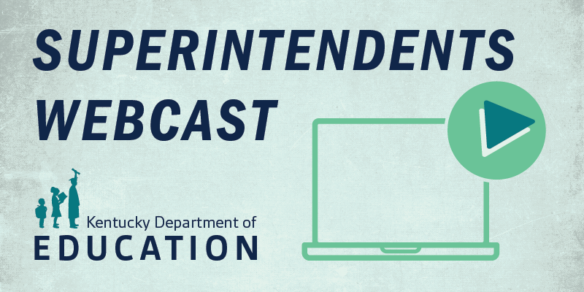
Kentucky Department of Education (KDE) team members provided an update on efforts to combat chronic absenteeism during a Superintendents Webcast on Aug. 14.
KDE defines a student as chronically absent if they have missed more than 10% of the enrolled time in school. This includes both excused and unexcused absences. Chronic absenteeism affects nearly 30% of students across the Commonwealth each year.
“When students miss school, they miss out on learning, meaningful relationships and countless other opportunities that are crucial for their development and future success,” said Commissioner of Education Robbie Fletcher.
Data presented by KDE Division of Student Success Director Christina Weeter shows that while districts have been dealing with chronic absenteeism for years, the problem spiked following the COVID-19 pandemic. In 2018, 5% of districts were considered to have high or extremely levels of chronic absenteeism; in 2023, that percentage was 77%.
Weeter said there are four contributing factors to chronic absenteeism:
- Barriers like chronic health conditions, family responsibilities, transportation, housing or food insecurity and community violence;
- Aversion to school because a student may be struggling academically, behaviorally or with their peers;
- Disengagement with school because the student feels bored or has a lack of connection and enrichment opportunities; and
- Misconceptions about staying home for illness and the belief that attendance “doesn’t matter” or that only unexcused absences are a problem.
KDE just launched a public messaging campaign to raise awareness of the issue, which includes ads on television, radio and billboards across the Commonwealth emphasizing that attendance matters. The billboard images feature messaging about how much students miss when they aren’t in school, like class, football games, band, gym class, lunch or playing with friends at recess. The TV and radio ads follow a similar theme.
KDE also provides tools in Infinite Campus to help school leaders track chronic absenteeism. For example, the Early Warning tool examines a composite of factors such as attendance, behavior, stability and academics in order to identify students at higher risk for dropping out. Infinite Campus also includes Insights data visualization dashboards, including attendance data and reports on chronically absent and transient student populations.
“We want to make sure it’s very evident what we have available already at the state level so that your district leaders and your school leaders can really make some decisions about how to address (chronic absenteeism),” Weeter said.
KDE also revamped its Chronic Absenteeism webpage with new resources for schools, families and communities.
Assessment and Accountability
The Kentucky United We Learn Council has been developing a number of assessment and accountability system prototypes that describe how Kentucky might revise its systems to align with the council-adopted moonshot: “To build a prosperous Kentucky, we will launch an accountability system that is meaningful and useful to all our learners.”
Fletcher provided an update on the Kentucky United We Learn Council meeting in July, where members started narrowing down what options will be in the product.
Since the meeting, a new prototype is in development, focusing on an accreditation-style model that includes a vibrant learning experiences indicator. Schools would submit evidence to an external evaluator and the local board of education and receive ratings on rubrics with feedback for improvement.
Kentucky Board of Education (KBE) Chair Sharon Porter Robinson said the work of the council is “amazing,” and members are “helping us dream big, be strong and bold and determined to have an accountability system that really serves the purpose that we are all devoted to.”
KDE is now entering the study phase of the new prototype, which will involve 36 districts providing direct feedback to KDE staff members and Kentucky United We Learn Council members – 18 districts from the Local Laboratories of Learning (L3s) and 18 others across the Commonwealth.
“There’s a specific set of questions we’d like for everyone to answer. What does this particularly look like? If we talked about through-course assessment, how is that implemented?” Fletcher said. “(And) what type of questions that you may have.”
Fletcher said the department is also going to seek input from all districts once the process starts.
Fletcher also thanked lawmakers who participated in the council’s discussions: Rep. James Tipton, Rep. Tina Bojanowski, Rep. Timmy Truett, Sen. Max Wise and Sen. Matt Deneen.
Kentucky Board of Education
Superintendents heard an update on the KBE meeting on Aug. 7-8, which was held at the Kentucky State University (KSU) Harold R. Benson Research and Demonstration Farm. KSU President Koffi Akakpo spoke to the board about issues he has seen in education, including the difficulties in preparing educators for the classroom and about how KSU’s teacher preparation program is addressing those issues.
Board members also provided input on the assessment and accountability prototype and key goals for the commissioner’s first year in office.
“Commissioner Fletcher is being supported and encouraged to continue our work on assessment and accountability, making the moonshot a reality for us all so that we can use important assessment data to improve practice and support stronger practice on behalf of our students,” Robinson said.
The KBE also welcomed three new members – Juston Pate, Paul Long and Mike Borchers – in addition to non-voting teacher member Lawrence McCrobie and non-voting student member Preston Graham.
Regional Early Literacy Leadership Network
KDE is creating a Regional Early Literacy Leadership Network to empower district teams to develop and implement an effective strategy for K-5 literacy grounded in high-quality instructional resources (HQIRs).
Micki Ray Marinelli, KDE chief academic officer, said 40 districts have submitted interest forms, so now the KDE Office of Teaching and Learning is reaching out to districts to determine next steps.
“Most importantly, we want to address challenges and problems that you’re facing at the local level in implementing the Read to Succeed Act ” she said, “and then be able to better support you and your teachers on behalf of students across your elementary schools.”
Ultimately, KDE is looking for regional partners made up of five to seven districts that are committed to participating in three sessions, with the first one taking place sometime in the fall. Marinelli said the Green River Regional Educational Cooperative, the Kentucky Educational Development Corporation and the Kentucky Valley Educational Cooperative have partnered with KDE to host the sessions.
KDE also is working to establish an advisory cabinet of local district leaders to help shape the agenda of the leadership network’s sessions.
“(The advisory cabinet) is very important to me because I want the network to be meaningful. I want it to be relevant and actionable,” Marinelli said. “If we’re asking educators to give of their time, we want to honor that by ensuring they benefit from the experience and can take back resources to serve their full district, so it matters to me that we hear from local leaders regarding the problems of practice.”
Marinelli also encouraged educators to register for the third cohort of Language Essentials for Teachers of Reading and Spelling (LETRS) professional learning through the Kentucky Reading Academies. Registration closes Aug. 30 and learning begins in October.
Superintendents also heard updates on:
- Registration for the 2024 Continuous Improvement Summit on Sept. 23-24; and
- A mini-grant opportunity from the Association for Teaching Black History in Kentucky to support teachers with projects or lesson ideas on Black history/Kentucky’s history.




Leave A Comment